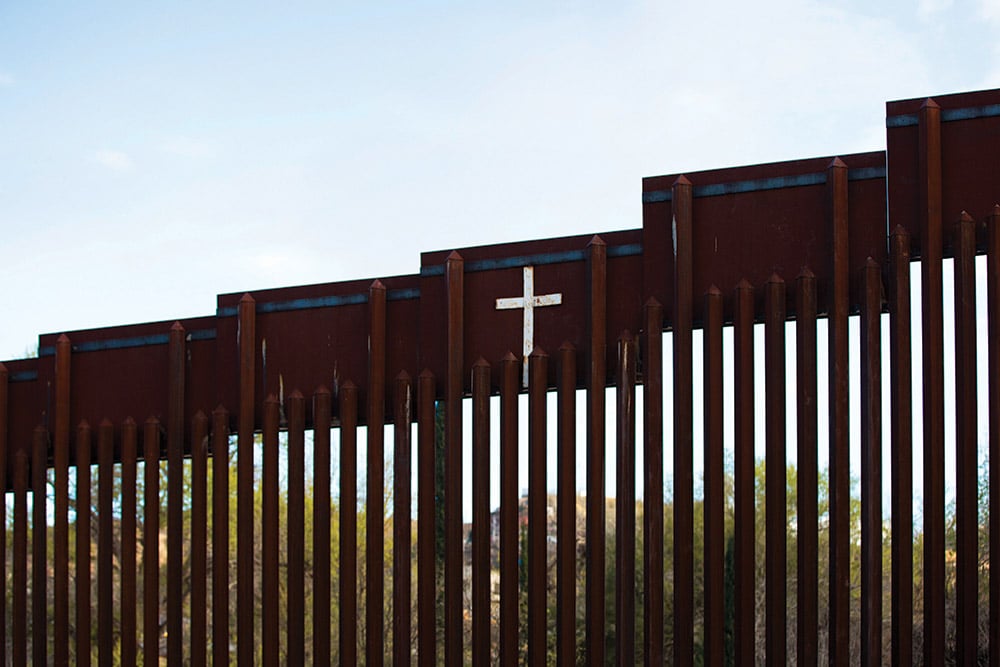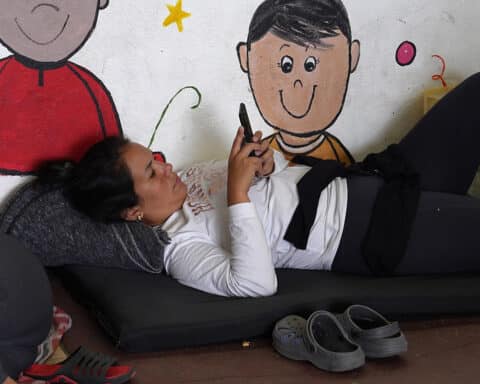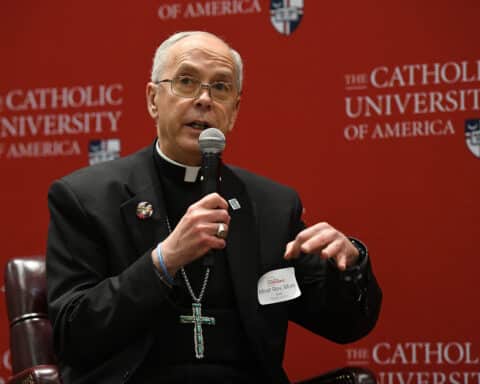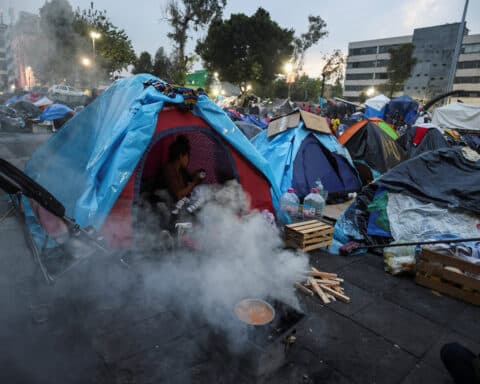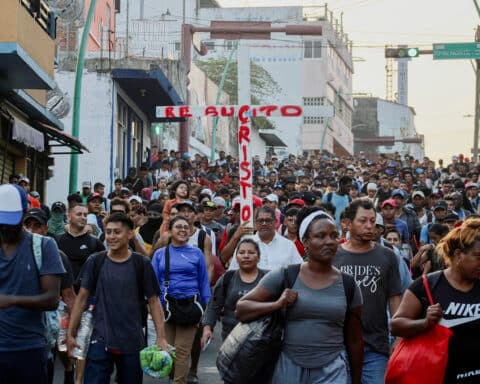Migration has been an integral part of the human story since Homo sapiens began to leave Africa more than 70,000 years ago.
DNA tests today show the migration paths that one’s ancestors took from the Horn of Africa, over tens of thousands of years, to populate Europe, Asia, Australia, India and the Americas.
“Migration is at the heart of who we are,” said Holy Cross Father Daniel G. Groody, a theology professor and director of the Global Leadership Program within the Kellogg Institute at the University of Notre Dame.
Father Groody told Our Sunday Visitor that migration is an important theme in humanity’s spiritual heritage. The spiritual patrimony of Jews, Christians and Muslims is closely connected with migration, beginning when God called Abraham to leave his Chaldean homeland.
The Old Testament also recounts the story of Abraham’s descendents migrating to Egypt during a famine. Hundreds of years later, the nation of Israel would escape slavery in Egypt and migrate back to Canaan, wandering in the desert for 40 years until reaching the Promised Land.
There would be more migrations, of course. The Babylonian exile was one forced example. In the New Testament, the Holy Family became refugees in fleeing Galilee for Egypt. Eventually, Joseph, Mary and Jesus migrated back home to Nazareth when the political situation allowed it.
Father Groody, who has studied and produced documentaries on immigration, also compares the Incarnation itself to a migration: God travels to Earth to take on human flesh, which empowers Christians to become a pilgrim people migrating through this world on the journey to their heavenly homeland.
“We need a new imagination on migration, one informed and inspired by a faith vision,” Father Groody said. “I think most people right now are just going on political dualisms. It’s not just a political issue; it’s a human issue, and it’s a spiritual issue.”
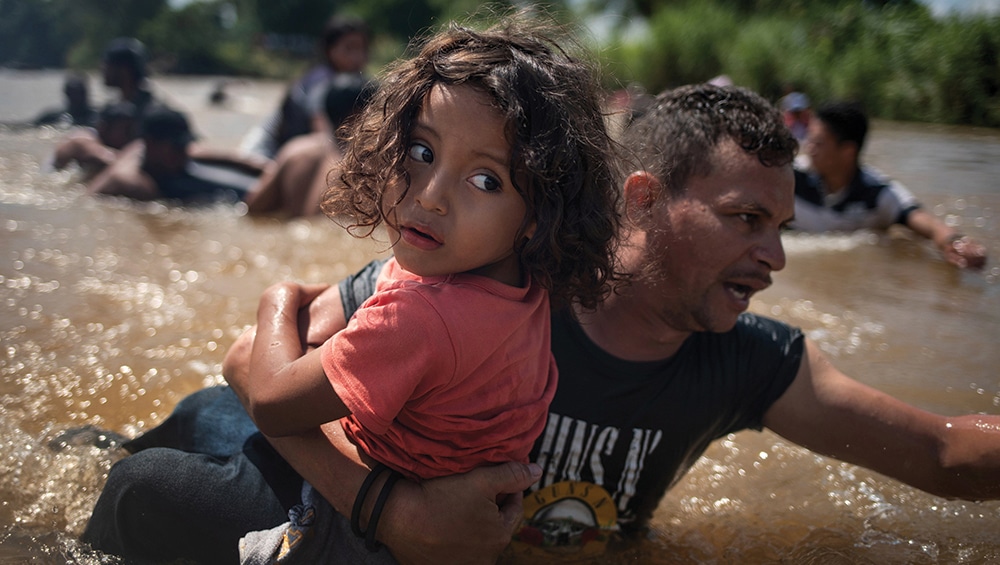
Right to opportunity in their homeland
The biblical grounding provides the foundation for the Catholic Church’s social teaching on migration. This rich body of teaching — which has been developed for more than 100 years through magisterial documents and numerous statements from several popes and bishops — takes its cue from the divine instruction to Israel to care for the stranger in its midst.
“You shall not oppress or afflict a resident alien, for you were once aliens residing in the land of Egypt,” the Lord tells Israel in Exodus 22:20.
In Leviticus 19:34, the Israelites are further instructed: “You shall treat the alien who resides with you no differently than the natives born among you; you shall love the alien as yourself; for you too were once aliens in the land of Egypt.”
| 5 Catholic Principles on Migration |
|---|
|
In a 2003 pastoral letter concerning migration, “Strangers No Longer: Together on the Journey of Hope,” the Catholic bishops of Mexico and the United States stated five Catholic principles regarding migration: 1. Persons have the right to find opportunities in their homeland. |
“Jesus also says in the Gospel, ‘I was a stranger and you welcomed me,'” Bishop Edgar da Cunha of Fall River, Massachusetts, said in quoting from the Lord’s instructions on caring for the least of these in Matthew 25.
Bishop da Cunha, who as a seminarian immigrated to the United States from Brazil, told OSV that the Catholic Church has “always defended a person’s right to migrate” because for many people, especially today, migration is a matter of life and death.
“It’s connected with human rights, the human need for work, for feeding one’s family, being able to have a decent, dignified life,” Bishop da Cunha. “For some people, migration is a necessity to meet those other human rights.”
Christ’s instructions to care for the stranger also show how individual nations will one day be judged in how they treat migrants and those who are vulnerable, said Donald Kerwin, the executive director of the Center for Migration Studies, a Scalabrinian think tank.
“The Church has always been concerned for people who are vulnerable, people who are at risk, people who are on the margins,” Kerwin told OSV. “These people are members of our communities. They’re our neighbors.”
While Catholic teaching has long promoted the principle of human rights, rooted in natural law and revelation, Pope Leo XIII’s 1891 social encyclical Rerum Novarum (“On the Condition of Labor”) developed a systematic presentation of the rights and responsibilities shared by people. That landmark encyclical also established the framework for Catholic social teaching on immigration.
“[N]o one would exchange his country for a foreign land if his own afforded him the means of living a decent and happy life,” Pope Leo XIII wrote in his social encyclical.
That statement speaks to the first two principles of Catholic social teaching on migration. The first, often forgotten, principle is that people have a right to find opportunities in their own homeland, to live in dignity and safety and achieve a full life through the use of their God-given gifts.
Following that principle, the U.S. bishops have often spoken out about the need to address the root causes of irregular migration by offering direct aid to improve economic conditions, public safety and the rule of law in Guatemala, Honduras and El Salvador, which struggle today with crippling poverty and widespread gang violence.
“The idea is not to just encourage everyone to migrate or emigrate to the United States,” Father Groody said. “The idea is to help people stay where they are.”
“States have the responsibility to create conditions that promote human rights and that promote the common good, which is the conditions that allow residents to flourish,” Kerwin added. “But, as we all know, oftentimes states fail at that, either because they don’t have the resources to succeed or because their leaders don’t have the inclination or share that vision.”
A person’s right to migrate
The second principle on migration in Catholic social teaching is that human beings have a right to migrate if that is the only way they can support themselves and their families. This principle is based on the Church’s teaching on the universal destination of all goods.
“That is, all the goods of the Earth belong to God and to God alone,” Father Groody said. “In the end, God is the final owner of everything. When we die, we have to give it up anyway. In this sense, private property has some value, and it is recognized by Catholic social teaching, but it’s subject to a larger vision of the common good.”
Bishop da Cunha, who sits on the U.S. Conference of Catholic Bishops’ Committee on the Pastoral Care of Migrants, Refugees and Travelers, said the Church has always defended a person’s right to migrate, “because for many people, migration is a matter of survival.”
“It’s connected with human rights, the human need for work, for feeding the family and being able to have a decent, dignified life,” Bishop da Cunha said. “For some people, migration is a necessity to meet those other human rights.”
Every pope since Leo XIII has recognized and defended the right to migrate. Pope Pius XII, writing in Exsul Familia Nazarethana, the 1952 Apostolic Constitution on the Spiritual Care to Migrants, said the “migrant Holy Family of Nazareth” is the archetype, model and protector “of every migrant, alien and refugee of whatever kind who, whether compelled by fear of persecution or by want, is forced to leave his native land, his beloved parents and relatives, his close friends, and to seek a foreign soil.”
“The fact that he is a citizen of a particular state does not deprive him of membership to the human family, nor of citizenship in that universal society, the common, worldwide fellowship of men,” said St. Pope John XXIII in his 1963 encyclical Pacem in Terris (“Peace on Earth”), who added that civil authority exists “not to confine men within the frontiers of their own nations, but primarily to protect the common good of the state, which certainly cannot be divorced from the common good of the entire human family.”
More recently, Pope Francis in September 2015 told a joint meeting of the U.S. Congress that thousands of people from Central America “are led to travel north” in search of a better life for themselves and their loved ones.
“Is this not what we want for our own children?” Pope Francis said. “We must not be taken aback by their numbers, but rather view them as persons, seeing their faces and listening to their stories, trying to respond as best we can to their situation.”
Before leaving their homes, Kerwin added that migrants often find themselves in the unenviable position of discerning what God wants them to do in order to provide for their families and protect them from harm.
Kerwin said: “Those people are really in the best position to determine, ‘Okay, can my children survive? Can I support my family? Are conditions so dangerous that we can’t remain here, that we have to move, or that I have to leave and send money home?”
A nation’s right to control its borders
On its face, the right to migrate appears to clash with another principle in Catholic social teaching on migration: Sovereign nations have a right to affirm sovereignty and control their borders.
“We never advocate that any country should open their borders completely and welcome everyone,” Bishop da Cunha said.
As explained in several documents published by the U.S. Conference of Catholic Bishops, no country has an absolute obligation to receive unlimited numbers of immigrants, asylum seekers and refugees to the point that its social stability and economic life are jeopardized.
“The bishops have long recognized the right of nations to secure their borders and for countries to have the ability as a sovereign nation to have laws regulating immigration,” said Ashley Feasley, the director of migration policy and public affairs at the U.S. Conference of Catholic Bishops.
Catholic social teaching affirms that national governments have a legitimate authority to control immigration and protect their borders, especially in the interest of national security. The Catechism of the Catholic Church teaches that political authorities, for the sake of the common good, “may make the exercise of the right to immigrate subject to various juridical conditions, especially with regard to the immigrants’ duties toward their country of adoption” (No. 2241).
The U.S. bishops conference has also urged Catholics to not view the federal government’s role in enforcing immigration laws as a negative, adding that the federal agents who enforce those laws often do so out of a sense of loyalty to the common good and compassion for poor people who seek a better life.
“Border security is not a black-and-white issue,” Feasley said. “If you talk to Catholic Charities agencies and humanitarian respite centers on the border, you’ll see that they often work hand-in-glove with Border Patrol and ICE officers in the transfer of families who are being released from custody.”
Catholic teaching also holds that migrants have a responsibility to respect the laws, social norms and cultural heritage of the receiving nations. The Catechism adds that immigrants “are obliged to respect with gratitude the material and spiritual heritage of the country that receives them, to obey its laws and to assist in carrying civic burdens” (No. 2241).
“There is some truth to it when people say a country’s immigration laws need to be respected,” Father Groody said. “But there’s more it to than that. It’s a complicated issue because there are a lot of issues at stake.”
| Bishops Respond to Immigration Reform Plan |
|---|
|
In a May 17 statement, Cardinal Daniel N. DiNardo of Galveston-Houston, the president of the U.S. Conference of Catholic Bishops, and Bishop Joe S. Vasquez of Austin, Texas, chairman of the bishop’s Committee on Migration, criticized President Donald Trump’s recent proposal to incorporate a “merit-based” immigration system that prioritizes high-skilled workers over those with relatives already in the country: “While we appreciate that the President is looking to address problems in our immigration system, we oppose proposals that seek to curtail family-based immigration and create a largely ‘merit-based’ immigration system. Families are the foundation of our faith, our society, our history, and our immigration system. … “[W]e must confront the root causes of migration and look to humane and pragmatic solutions, such as improving our immigration courts, expanding alternatives to detention, and eradicating criminal networks. We urge lawmakers to put aside differences and engage in meaningful action on humane and just comprehensive immigration reform.” |
While countries have a right to regulate immigration flow, Catholic social teaching holds that this right is not absolute, especially if a country’s immigration laws are unjust, grounded in xenophobia and racism, and designed to keep out as many immigrants as possible while raising up obstacles and making life difficult for migrants, refugees and asylum seekers.
“A nation cannot use national sovereignty as an excuse to not welcome anybody, to close their borders and say, ‘We have no more room,'” Bishop da Cunha said.
Feasley said the host nations have a responsibility “to make sure that the implementation and creation of immigration laws are just, are humane, are proportionate and, frankly, are transparent to its own citizenship.”
Detaining or turning away asylum seekers, separating migrant children from their parents as a deterrent against illegal border crossings and imprisoning unauthorized migrants with no criminal backgrounds would be examples of unjust immigration law enforcement, Catholic immigration experts told OSV.
“States have a legitimate authority to regulate migration, but when they come up against people who are fleeing for their lives or are in extraordinary desperate circumstances, that authority has to recognize that reality, and it has to treat those people at the very least with dignity and respect for their rights,” Kerwin said.
Catholic social teaching would say that deportation is a legitimate tool in a country’s immigration law enforcement system. The federal government can make a strong argument for deporting a violent criminal and drug trafficker who crossed the border illegally.
But arresting and deporting a breadwinning husband and father whose only crime was entering the country without documents — a civil misdemeanor in U.S. federal law — would be a different matter under the Church’s social teaching.
“The bishops would urge us to ask, ‘Is that a just outcome?'” Feasley said. “Is that the use of deportation that this country wants to be using? Is that a proportionate and humane outcome?”
As explained in Catechism of the Catholic Church (No. 2241), more prosperous nations such as the United States are obliged, to the extent that they are able, to “welcome the foreigner in search of the security and means of livelihood which he cannot find in his country of origin.”
The Catechism (No. 2243) also holds that the public authorities in the receiving countries should respect the innate human rights of migrants and to protect them from all forms of unjust discrimination.
“The call to solidarity is also a call to promote the effective recognition of the rights of immigrants and to overcome all discrimination based on race, culture, or religion,” the U.S. Bishops wrote in their 2000 pastoral statement “Welcoming the Stranger Among Us: Unity in Diversity.”
Some would argue that a country’s immigration laws should be based purely on national self-interest, especially as its regards economic policy. In this thinking, a country may look to limit entry of poor or uneducated migrants in favor of high-skilled, college-educated immigrants from more developed nations.
That type of national self-interest view runs counter to the more humane vision articulated in Catholic social teaching, which says that a developed nation’s right to limit immigration must be based on justice, mercy and the common good.
“The notion of the common good is an embracing concept. What we promote is the integral human development of everybody, and immigrants are included in that,” Kerwin said.
Besides the economy, Catholic social teaching holds that a nation’s immigration policy should take into account important human values such as the right of families to live together. A merciful immigration policy, for example, would not force married couples or children to live apart from their families for long periods of time.
“Sometimes we use the national interest in a very selfish way,” Bishop da Cunha added. “That can be people not wanting to be bothered by poor people or immigrants moving into their area. That kind of selfishness is something the Church is against. We can’t use self-interest as an excuse to exclude immigrants.”
Father Groody added that a nation’s economy “is made for human beings, not human beings for the economy.” He also warned against a “market fundamentalism” that would reduce the human worth of migrants to their value as cogs in an economic system.
“Catholic social teaching raises major questions about what is the human economy and ultimately what is referred to as the divine economy,” Father Groody said. “The human economy is considered in terms of financial transactions, but the divine economy is a lot bigger than that. It’s not just the exchange of goods, and movement of money and capital. It’s based on grace, gratuity, mercy, forgiveness; all the stuff that we can’t earn, achieve and accomplish on our own.”
Protection and respect for migrants
Rather than as something to be tolerated or grudgingly accepted, Catholic social teaching says immigration enriches a receiving nation. In being exposed to new cultures and new traditions, native-born people are moved to open their hearts to “the other” and expand their worldviews and understanding.
In “Welcoming the Stranger Among Us,” the United States bishops said the presence of people from many different cultures and religions in the U.S. has challenged the Church in America “to a profound conversion” so that the people of God can truly become a sacrament of unity.
“The new immigrants call most of us back to our ancestral heritage as descendants of immigrants and to our baptismal heritage as members of the body of Christ,” the bishops said.
Because it affirms the human dignity of all people, even migrants who crossed the border without legal documents, the Church makes no distinction between “legal” and “illegal” when it welcomes immigrants into local faith communities and offers them pastoral support and social services.
“Can a brother be illegal? Can a sister be illegal? Can a mother be illegal? Can a child be illegal? Of course they can’t. That’s a terrible way to talk about human beings,” Kerwin said. “It really is offensive to human dignity.”
Because they are seen as valuable members of the community, the Church seeks to integrate migrants into the collective life of the local parish, the diocese and the nation. Catholic immigration advocates often speak out on their behalf in public policy and legislative matters. Catholic parishes also host citizenship drives from time to time to encourage immigrants who are eligible to become naturalized citizens.
“The Catholic Church over the years has been one of the biggest proponents of citizenship,” Feasley said. “Why? Because it’s the full measure of integration from a U.S. secular civic standard in being able to fully participate in American life.”
Referencing the Exodus story, Father Groody said extending that kind of radical solidarity with migrants is a Christian response to the God who first loved humanity and sent his only begotten Son to redeem them from sin.
“Caring for the stranger and the preferential option for the poor is not just a moralistic, social ethic that comes out of nowhere,” Father Groody said. “It begins with a recognition of what God has done for us in our poverty.”
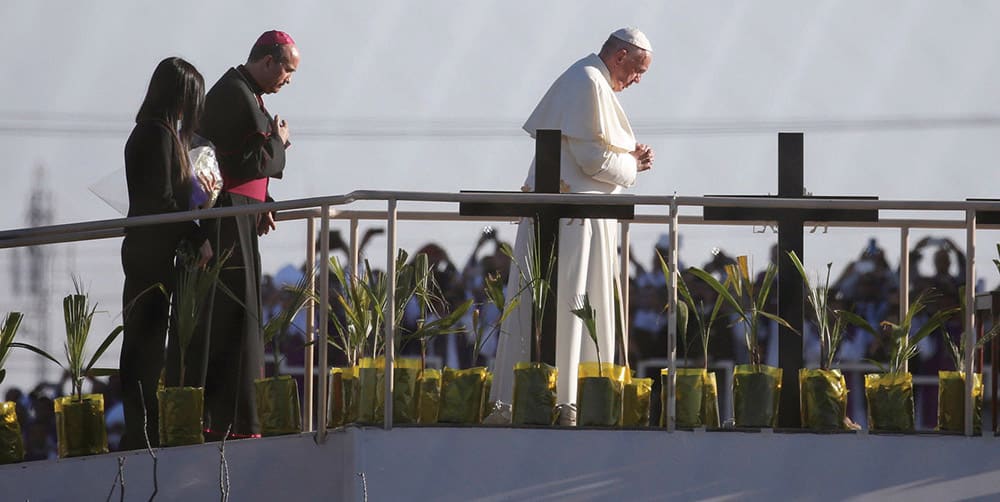
In light of that scriptural understanding of caring for the stranger, then nativist and anti-immigrant attitudes are to be seen as deeply unbiblical, even anti-Catholic to some extent. Kerwin described nativitism as “historical and biblical amnesia,” especially given that the first waves of Catholic immigrants to the United States experienced harsh discrimination from the Protestant establishment.
It shows a lack of understanding, a lack of empathy and identification with immigrants, as well as an inability to connect one’s own migration history with the experience of those who are coming today,” Kerwin said. “Because in truth, they’re not that different.”
Kerwin added: “Catholics need to become more Catholic on this issue.”
Brian Fraga is a contributing editor for Our Sunday Visitor.
| What Would a Just Immigration System Look Like? |
|---|
|
The U.S. Catholic bishops have long supported a comprehensive immigration reform plan that would provide a pathway to legal status and eventual citizenship for millions of people living in the United States who illegally crossed the border several years and decades ago. Asked what a just immigration system would look like from a Catholic social teaching standpoint, Ashley Feasley of the U.S. Conference of Catholic Bishops and other Catholic immigration experts told OSV that such a system would need to include a path to legal status. “We have to address that population that is here. It goes back to the Catholic social teaching principle of integration,” Feasley said. “Those teachings just don’t apply to people with legal status. They apply to everybody,” said Don Kerwin of the Center for Migration Studies. “There is a real distinction made between a country’s immigration policies and the people who are actually living here in communities.” A just immigration system would not only facilitate a fair legal flow of migration across the border, but it would also look to address the root causes of why people flee their countries of origin, such as poverty and violence. “The system would also be such so that families are not divided because in many situations, children are taken from their parents, who are at risk of losing their children permanently and not knowing where they are,” Bishop da Cunha said. “That is so dehumanizing.” A just system would also permit visas to reunite families, which Catholic advocates said should be a bedrock principle of any nation’s immigration laws. “We don’t want families to be separated,” Feasley said. “Attacking so-called chain migration is really an attack on the family-based immigration system.” A fair system also allows refugees to seek asylum, which is a guaranteed legal right in international law. Their asylum claims would be adjudicated in a timely manner, during which time the refugees and their families would be kept safe and their basic needs cared for. |

